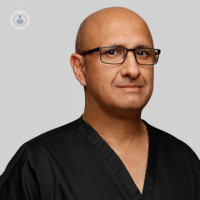Rectal bleeding: Causes, diagnosis and treatment
Written in association with:In his latest online article, renowned consultant colorectal surgeon Mr Tushar Agarwal offers his expert insight into rectal bleeding. He delves into the possible causes, how it’s diagnosed and the treatment options.

What are the common causes of rectal bleeding?
The causes of rectal bleeding vary depending on age groups. In younger individuals, it's often due to conditions such as haemorrhoids, fissures, or inflammatory bowel disease. As one progresses into the age group of 40 and older, conditions like diverticular disease become more common. Additionally, beyond the age of 40, it's crucial to consider issues like colonic polyps and colorectal cancers.
Is rectal bleeding always indicative of a serious medical condition?
Most of the time, rectal bleeding isn't a sign of a serious medical condition. Frequently, it stems from common issues like haemorrhoids or diverticular disease. However, it's imperative to undergo proper investigation because rectal bleeding could signal a serious underlying problem. Therefore, it should never be taken lightly without ruling out potential serious causes.
What tests are necessary?
A comprehensive assessment begins with taking a detailed history from the patient, evaluating the type of bleeding, associated symptoms like itching, bowel patterns, and any unexplained weight loss. In the clinic, patients undergo physical examinations, including a rectal examination. Often, a small telescope is used to examine the rectum. Further investigations may involve a colonoscopy, which examines the colon using a camera after preparation. In older individuals, a virtual colonoscopy, or a CT scan of the bowel, is often recommended.
What are the available treatment options for rectal bleeding, and when should one seek medical attention?
Treatment options depend on the underlying cause. For issues like haemorrhoids, conservative measures are typically effective. In some cases, interventions such as banding, injections, or laser treatment may be necessary.
Severe haemorrhoids may require surgical removal. For conditions like diverticular disease, lifestyle changes and dietary adjustments can alleviate symptoms. However, if the cause is potentially serious, such as colorectal cancer, prompt medical attention is necessary. Cancer treatment depends on its stage and may involve surgery, oncological treatment, or both.
Are there lifestyle changes or preventive measures to reduce the risk of rectal bleeding?
Preventive measures vary depending on the cause. For haemorrhoids, simple practices like avoiding straining during bowel movements, maintaining a high-fibre diet, staying hydrated, and minimising time spent on the toilet can be beneficial. Similarly, increasing fibre intake can help prevent diverticular disease by reducing the risk of diverticula formation and associated symptoms.
Mr Tushar Agarwal is a renowned consultant colorectal surgeon based in London. If you would like to book a consultation with Mr Agarwal, you can do so today via his Top Doctors profile.


